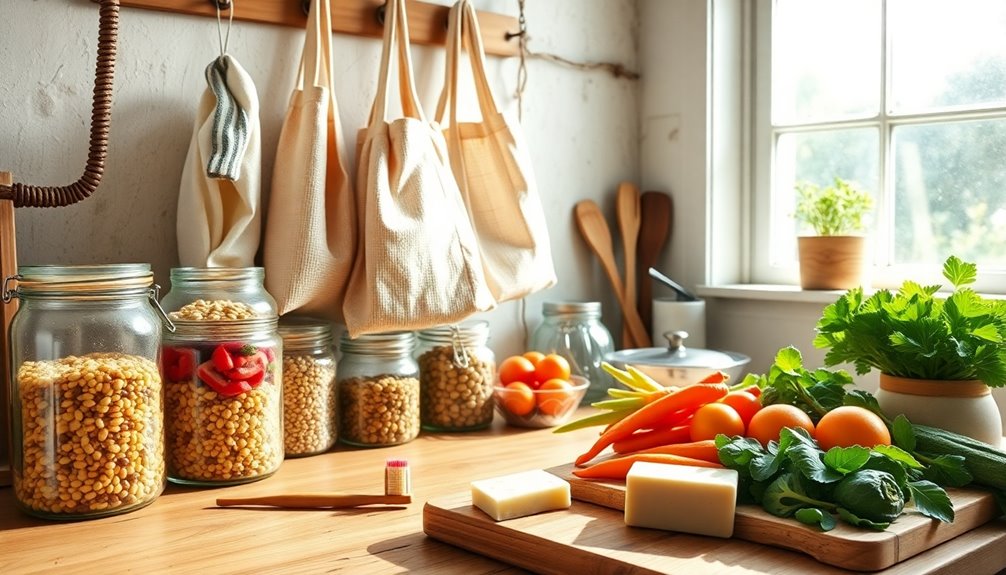To live a zero-waste lifestyle, start by assessing your current waste habits. Track what you throw away to identify areas for improvement. Use reusable bags, invest in a stainless steel water bottle, and bring your containers for bulk shopping. Focus on composting organic waste to reduce landfill contributions. Prioritize quality products and consider sustainable brands. Small, mindful changes can make a big difference in your impact, and there's plenty more to explore on this journey.
Key Takeaways
- Track your waste for a week to identify patterns and areas for improvement in your daily habits.
- Invest in reusable items like bags, water bottles, and containers to reduce single-use products.
- Shop consciously with a list, focusing on local markets and bulk purchases to minimize packaging waste.
- Start composting by collecting organic materials and learning proper layering for effective decomposition.
- Support sustainable brands and products that align with zero-waste principles and ethical practices.
Understanding the Zero-Waste Philosophy
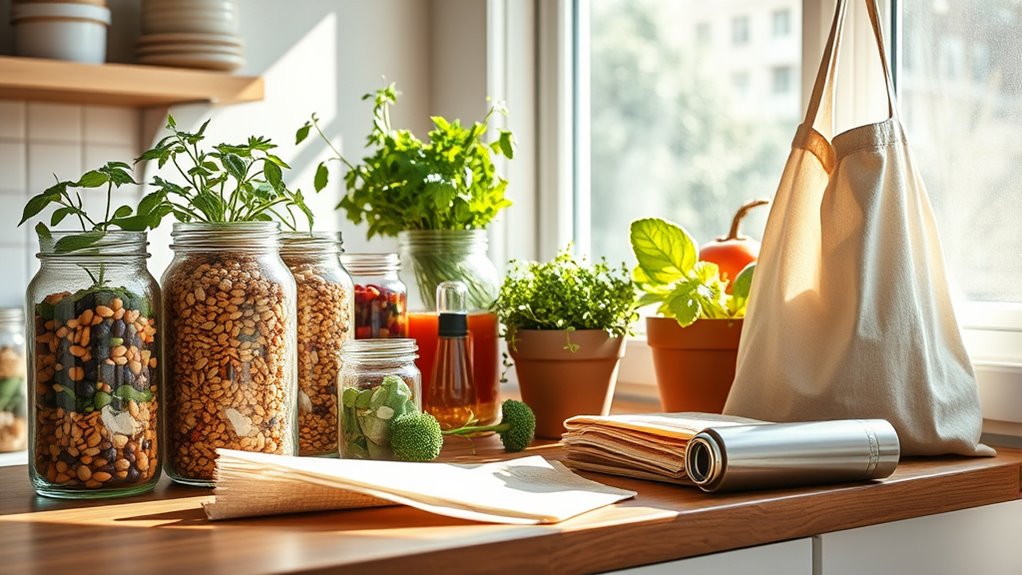
The zero-waste philosophy revolves around the idea of reducing waste to an absolute minimum in our daily lives. It encourages you to rethink how you consume and dispose of products. By embracing this mindset, you can minimize your impact on the environment and promote sustainability.
Start by considering the lifecycle of the items you purchase—are they reusable, compostable, or recyclable? Prioritize quality over quantity, choosing durable products that last longer. You'll also want to explore alternatives to single-use items, like cloth bags instead of plastic ones.
This philosophy isn't just about recycling; it's about making conscious choices that reflect your values. Adopting a zero-waste lifestyle empowers you to create a cleaner, healthier planet for future generations.
Assessing Your Current Waste Habits
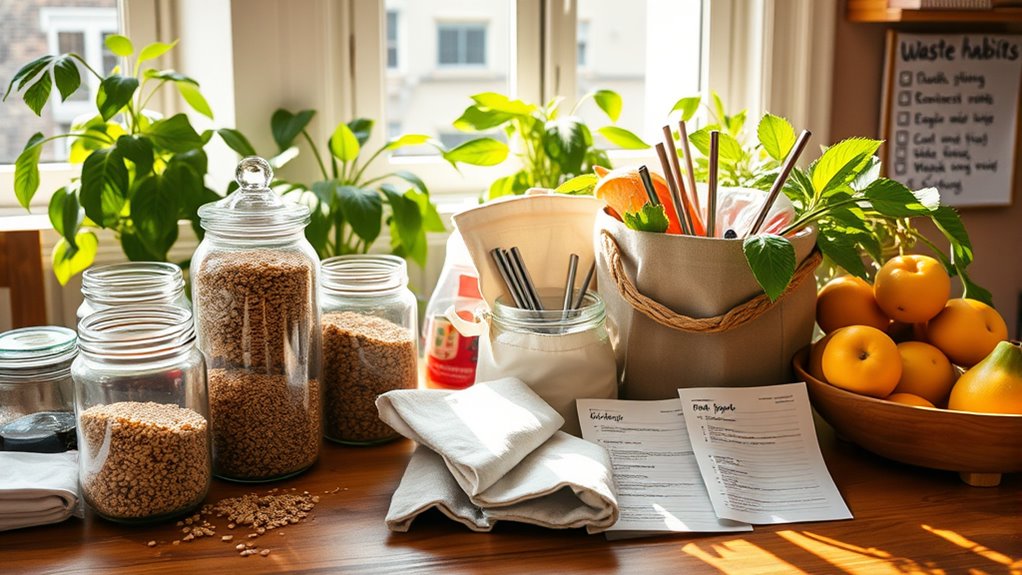
Understanding how your current habits contribute to waste is a vital step in adopting a zero-waste lifestyle. Start by tracking your waste for a week. Note what you throw away daily, including food scraps, packaging, and single-use items. This'll help you identify patterns and areas for improvement.
Next, assess your shopping habits. Do you buy in bulk or rely on convenience items? Consider the materials your purchases come in—plastic, glass, or paper.
Additionally, evaluate your recycling practices. Are you properly sorting items, or are they ending up in the trash? By reflecting on these behaviors, you'll gain insights into where you can make changes.
Essential Tools for a Zero-Waste Lifestyle
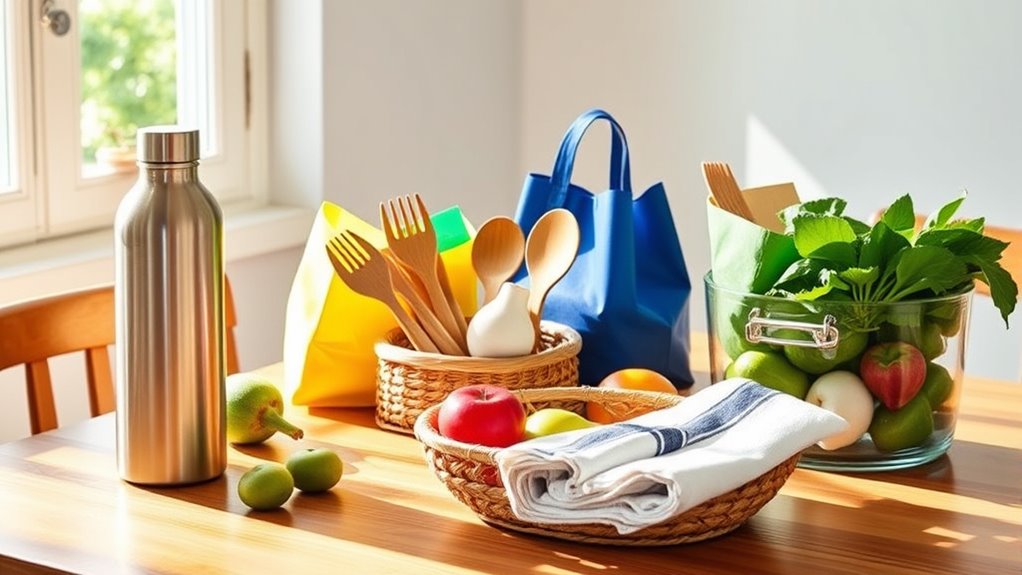
Embracing a zero-waste lifestyle requires a few essential tools that make the transition smoother and more effective.
Start with reusable bags for shopping and carrying items, which help you avoid single-use plastics. Invest in a good-quality stainless steel or glass water bottle to reduce plastic waste and stay hydrated.
A set of metal or bamboo straws is also handy for on-the-go drinks. For food storage, opt for glass containers or beeswax wraps instead of plastic wrap.
Finally, a high-quality compost bin can transform your kitchen waste into nutrient-rich compost.
With these tools in hand, you'll find it easier to adopt sustainable habits and significantly reduce your waste footprint.
Sustainable Shopping Tips

With your reusable bags and glass containers ready, you're set to tackle sustainable shopping.
Start by making a list; this helps you avoid impulse buys and stick to what you really need. Choose local farmers' markets or bulk stores whenever possible, as they usually offer fresher produce and minimal packaging.
Making a shopping list helps you focus on essentials, while local markets provide fresh produce with less packaging.
Look for products made from sustainable materials or those that come with refill options. Don't forget to check the labels for eco-friendly certifications.
Bring your containers for bulk items like grains, nuts, and spices to cut down on single-use packaging.
Lastly, support brands that prioritize sustainability and ethical practices.
Creative Ways to Repurpose and Reuse

While you might think of recycling as the only way to reduce waste, repurposing and reusing items can spark your creativity and make a significant impact.
Look around your home—old glass jars can become stylish storage containers, and worn-out t-shirts can transform into reusable shopping bags. Got extra cardboard? Cut it into shapes for fun kids' crafts or DIY organizers. You can even use wine corks for unique coasters or bulletin boards.
Don't forget about furniture; a fresh coat of paint can give that old chair a new life! By finding creative uses for what you already own, you not only save money but also contribute to a more sustainable world.
Let your imagination guide you!
Composting Basics for Beginners

Repurposing and reusing items around your home can lead you to another impactful practice: composting. Composting transforms your kitchen scraps and yard waste into nutrient-rich soil, which benefits both your garden and the environment.
Start by collecting organic materials like vegetable peels, coffee grounds, and yard trimmings. Avoid adding meat, dairy, or oily foods, as they can attract pests.
Choose a compost bin or create a designated pile in your yard. Layer your greens (nitrogen-rich materials) and browns (carbon-rich materials) to promote healthy decomposition.
Turn the pile regularly to aerate it and speed up the process. In a few months, you'll have dark, crumbly compost ready to enrich your plants, reduce waste, and support a more sustainable lifestyle.
Building a Supportive Zero-Waste Community
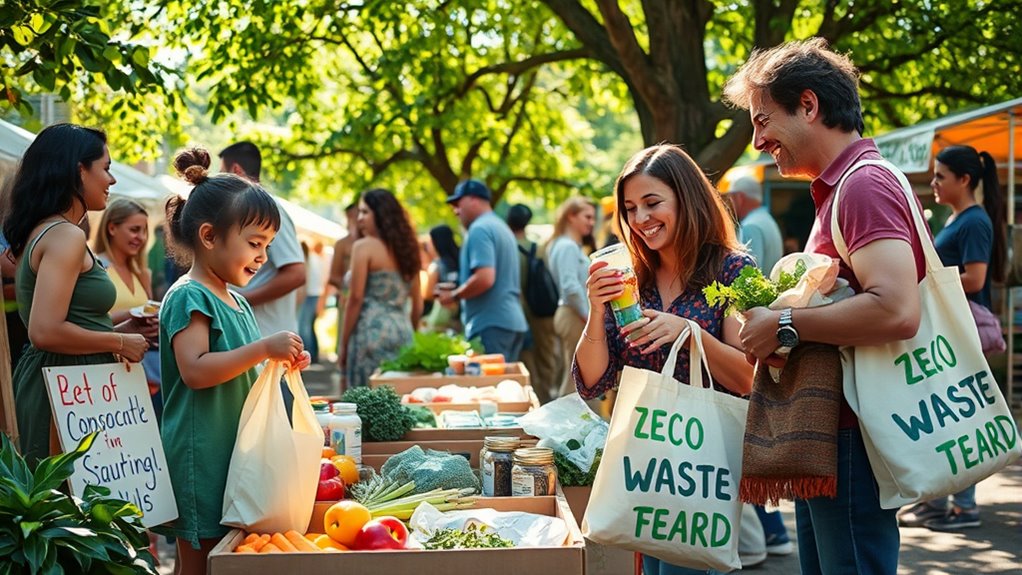
As you embark on your zero-waste journey, connecting with like-minded individuals can make all the difference. Seek out local groups or online communities that share your passion for sustainability. Join social media platforms, attend workshops, or participate in community clean-ups to meet others on similar paths. Sharing experiences and challenges fosters motivation and accountability.
Consider starting a zero-waste group in your neighborhood. Organize swaps for reusable items, host potlucks featuring zero-waste recipes, or collaborate on community gardens.
Encourage open discussions about waste reduction strategies, so everyone can learn from each other. By building a supportive network, you'll feel empowered to make more sustainable choices while inspiring others to join the movement. Together, you can create positive change for your community and the planet.
Frequently Asked Questions
How Can I Encourage My Friends to Adopt Zero-Waste Practices?
To encourage your friends to adopt zero-waste practices, start by sharing your own experiences.
Show them how easy and rewarding it can be by inviting them to join you on eco-friendly outings, like a bulk shopping trip or a DIY project.
Organize discussions where everyone can share ideas and tips.
You could even challenge each other to reduce waste for a month.
Your enthusiasm will inspire them to join the movement!
What Are the Most Common Misconceptions About Zero-Waste Living?
You might think zero-waste living means you can't use any products or that it's only for environmentalists.
Many believe it requires a complete lifestyle overhaul, which isn't true. It's more about making small, sustainable choices. You don't need to be perfect; even reducing waste in small ways counts.
Some fear it's too expensive, but many zero-waste practices save you money in the long run.
Embrace the journey, and remember, every little bit helps!
How Do I Handle Personal Care Products in a Zero-Waste Lifestyle?
When you're choosing personal care products, think sustainable, think reusable, think natural.
Opt for bar soaps instead of liquid ones, use bamboo toothbrushes instead of plastic, and make your own skincare items with simple ingredients.
You'll save money, reduce waste, and benefit your skin.
Remember to avoid single-use packaging and support brands that prioritize eco-friendly practices.
Can Zero-Waste Living Save Me Money in the Long Run?
Absolutely, zero-waste living can save you money in the long run.
By investing in durable, reusable products instead of single-use items, you'll cut down on frequent purchases. You'll also find that bulk buying reduces costs, as does making your own cleaning supplies and personal care products.
Plus, minimizing waste often encourages you to be more mindful of your consumption, leading to smarter spending choices.
Embrace the shift, and watch your savings grow!
What Should I Do With Items I Can't Repurpose or Recycle?
It's easy to feel overwhelmed when you encounter items you can't repurpose or recycle, but don't worry!
You can start by donating them if they're still usable. Consider local charities or shelters.
If they're beyond repair, look into safe disposal options—many communities offer special collection days for hazardous waste.
You could also explore creative ways to upcycle or even trade with friends.
Conclusion
By embracing a zero-waste lifestyle, you're not just reducing your waste; you're making a significant impact. Did you know that the average person generates about 4.4 pounds of trash every day? Imagine the difference if everyone committed to minimizing waste! As you take these steps, remember that every small change counts. Building a supportive community can help you stay motivated. Together, you can inspire others to join the movement and create a cleaner, healthier planet for future generations.
